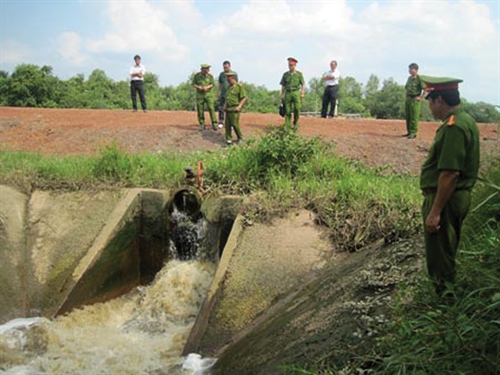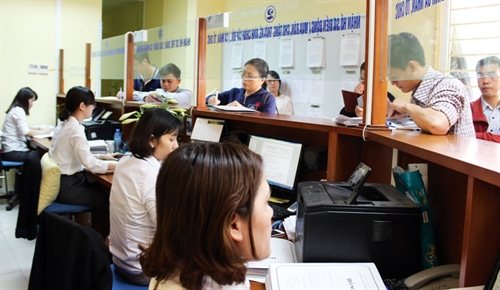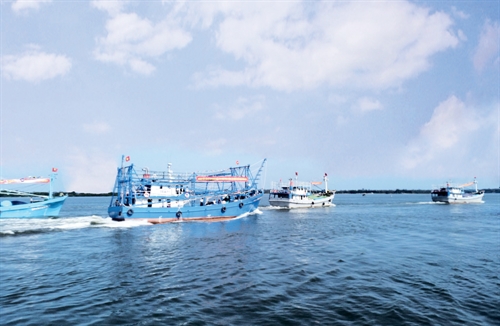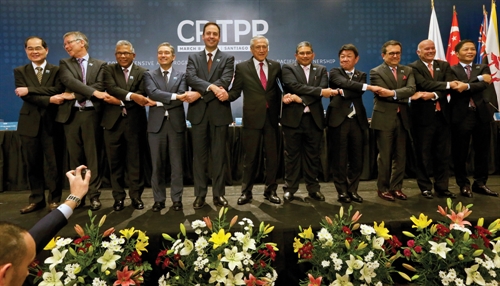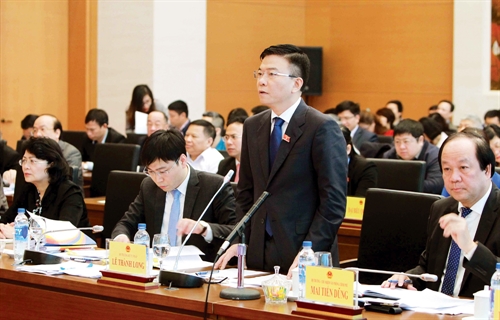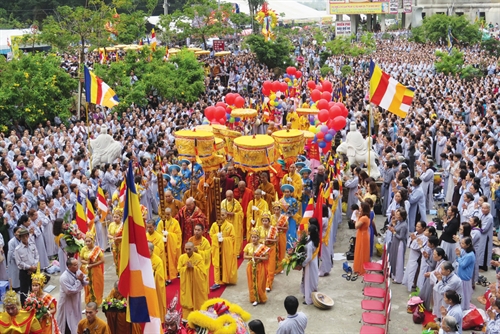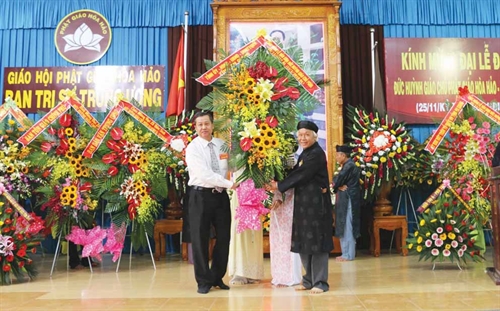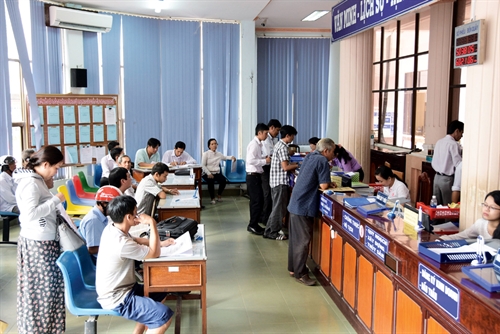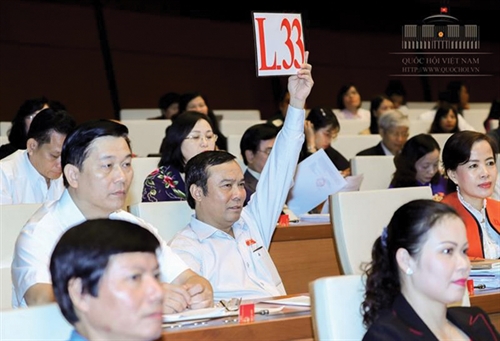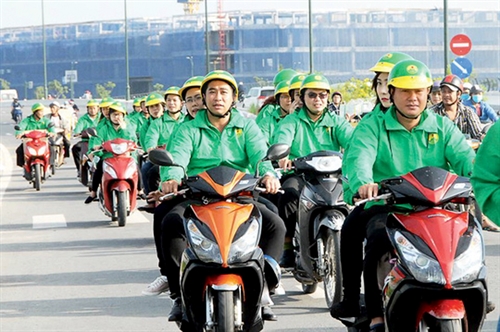The fifth session of the 14th National Assembly (NA) will open on May 21 and last 19 working days, making it the shortest session in the last decade, said NA General Secretary Nguyen Hanh Phuc at the 23rd meeting of the NA’s Standing Committee that took place in Hanoi from April 10-17.
Talking about preparations for the upcoming NA session, Phuc said the NA would spend 11 days on lawmaking and seven days on major issues.
The NA was scheduled to consider passing three new laws including the Law on Special Administrative-Economic Zones, Law on Cyber Security, and Law on Topography and Cartography, and amendments to four laws concerning denunciations, competition, national defense, and physical training and sports. The resolution on the law- and ordinance-making program for 2019 was also expected to be adopted at this session, Phuc said.
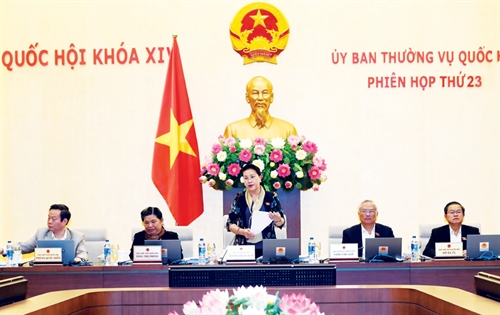 |
| On April 17, NA Chairwoman Nguyen Thi Kim Ngan chairs and addresses the closing session of the NA Standing Committee’s 23rd meeting__Photo: Trong Duc/VNA |
Legislators will also debate nine draft laws on corruption, urban development management, special amnesty, coast guard, and higher education, among others.
Meanwhile, four draft laws have been removed from the fifth session’s agenda, with two new laws on public administration and population and amendments to two others concerning enforcement of criminal judgments and environmental protection tax.
Regarding the question-and-answer (Q&A) session, Phuc said a fast-track session would be piloted in the coming NA sitting.
NA Chairwoman Nguyen Thi Kim Ngan said Q&A sessions in future would be improved.
“Each NA deputy will have only one minute to ask a question and, after receiving three questions, the questioned person will have up to three minutes to answer each question,” she said.
The NA leader also agreed with a proposal to spend less time on discussions in groups and more time on plenary sessions of debate.
Incentives for special zones
Discussing the draft Law on Special Administrative-Economic Zones, the NA Standing Committee focused on preferential policies to attract investment in these zones.
The zones include Van Don in the northern province of Quang Ninh, Bac Van Phong in the coastal central province of Khanh Hoa, and Phu Quoc in the southern province of Kien Giang.
Chairman of the NA Law Committee Nguyen Khac Dinh said tax incentives for these zones, as regulated in the draft law, strictly followed the Party’s direction to ensure they can compete with other zones around the world and draw investment.
Most of tax incentives drafted in the law would be applied for a given period and to investment projects in sectors prioritized for development and in which investment is needed in the stage of construction of these zones, he said.
The three zones defined providing tourism and entertainment services, including casinos, as one of the projects prioritized for development and investment attraction, Dinh noted.
NA Vice Chairman Phung Quoc Hien stressed the main target of the establishment of these zones was to create economic driving force and promote the competitive advantages of each zone so efficiency must be put on the top.
“How will these zones bring in profits for the country? How will the results be in the long-term period?” he said, adding the drafters should study specific resources in order to ensure feasibility.
He also highlighted the need to carefully calculate and make sure there are reasonable preferential policies, including tax break, to avoid creating burden on the state budget.
Coast Guard an armed force?
During this session, legislators also worked on the draft Law on the Coast Guard. A majority of them agreed to the necessity to promulgate the law to ensure consistency in the legal framework and create a legal foundation for all coast guard activities.
Lieutenant General Le Chiem, Deputy Minister of National Defense, said the Ordinance on the Coast Guard was not compatible with the position, functions and powers of the Vietnam Coast Guard in the current situation. In addition, the Ordinance has revealed some inadequacies that need to be rectified in order to comply with the Constitution.
Many lawmakers suggested the law-drafting committee carefully review the contents to guarantee consistency and avoid creating redundancy between the draft law and relevant laws, especially on issues relating to the organization, competence and legal status of the Vietnam Coast Guard.
Regarding the functions of the Vietnam Coast Guard, most deputies agreed to consider it an armed force. However, many suggested the need to further clarify the legal status of this force.
It’s illegal to confiscate undeclared assets
Lawmakers also worked on draft amendments to the anti-corruption law, debating whether to apply a 45 percent tax on extra personal income that public servants fail to declare.
The tax in question was one of two main solutions proposed by the Government Inspectorate to aid the fight against corruption. The other was to levy an administrative penalty worth 45 percent of the unreported assets.
Chairwoman of the NA’s Committee on Judicial Affairs Le Thi Nga, however, said that the Government was unable to track all sources of income of civil servants, partly due to the country’s culture of wealth management.
Money tends to be given or inherited without legal papers, she said, making it almost impossible for recipients to clarify the origin of those assets to authorities. The blurred line between legally and illegally acquired wealth was a huge challenge for inspectors.
“Legally speaking, the principle of the presumption of innocence prevents us from assuming one guilty of corruption if he fails to declare all of his assets, and stops us from confiscating them,” Nga said.
One solution was to view unreported income as untaxed income and to start collecting tax from it, at a proposed rate of 45 percent.- (VLLF)
